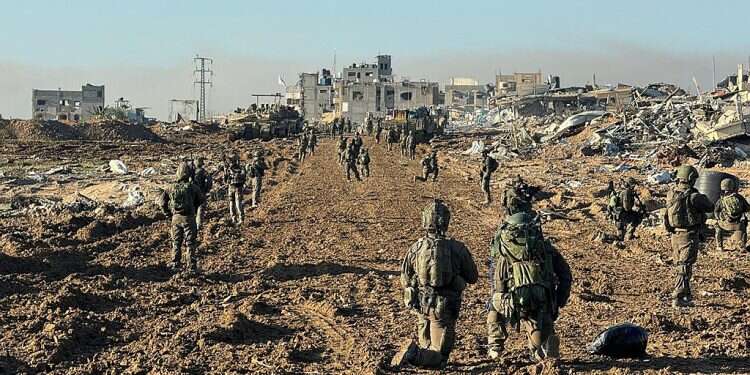The recent events in the war require Israel's political and security leadership to change the conditions under which the IDF operates in the Gaza Strip.
Follow Israel Hayom on Facebook, Twitter, and Instagram
The war machine continues to work well, the IDF wins every battle and delivers gains, but in many cases, these are merely tactical achievements at a very high cost. The nature of the Israeli offensive has changed: Extensive air strikes by fighter jets have become less common; the ground fighting is intense, but it provides Hamas with opportunities to harm our forces using methods for which it has prepared well in advance and through tunnel shafts, ambushes and traps that it had pre-planned.
Video: Israeli hostages being handed over by Hamas on November 28, 2023 / Credit: Social media
But while the conditions under which our forces operate are more difficult than in the past, for Hamas fighters, things have improved. They have benefited from the humanitarian supplies that Israel allows to pass through via the Kerem Shalom crossing; the fuel brought into the Gaza Strip is used to keep the tunnels active. Hamas continues to demonstrate resilience and stamina, maintains its senior command, continues to have intermittent control over the area; and it feels re-energized by Qatar and Egypt, slowly shaking off the ISIS stain that stuck to it on October 7. It has also drawn encouragement from the internal pressure in Israel and reports of the diplomatic clock that is ticking for the offensive. All this gives it hope that it could survive as an organization and as the governing authority and exploit the bargaining chips in its hands to end the war through some political arrangement.
Video: Biden speaks about Netanyahu during / Credit: Reuters
Clear evidence of how it assesses its situation can be found in its intransigence when it comes to reaching another deal to release captives. If in the first stage of the fighting, Hamas begged for a ceasefire and was willing to pay for it by releasing some 100 captives, now it feels confident enough to reject any deal that does not include the complete end of the war, the release of all terrorists imprisoned in Israel and guarantees designed to ensure that it remains the central power broker in the Strip.
Such an endgame would be another disaster for Israel's security and regional standing, which relies to a considerable extent on its perceived might.
Israel cannot afford to let the war become a stalemate or a war of attrition The scope of casualties we sustain directly affects the nation's morale and also the public's support for continuing the war. On the other side of the border casualties only strengthen the morale.
The actions in the diplomatic, economic, and civilian arenas, just like those on the battlefield, must serve the strategy of reaching our goals in the shortest amount of time and at the lowest cost. Israel should ratchet up the pressure on Hamas in every aspect; we must return to the formula that served Israel in the first stage of the fighting: massive air attacks; evacuation of populations from areas not yet attacked (such as refugee camps in the center of the strip); preventing the return of residents who evacuated from the north (not even to what remains of their homes); targeted assassinations in and out of the strip; and no less important – control over the supply and fuel entering the strip. The aid should be seen as if it were ammunition; namely, it must limited in scope and monitored so that there is no diversion to Hamas.
Without fuel, food, and logistical means, Hamas terrorists will find it difficult to survive inside the tunnels and will be forced out into the open. Allowing in supplies is a serious mistake. Hamas gets to have de facto control over most of the aid entering the strip and uses it to shore up its status as the governing authority over the population.
Israel has effectively given up on imposing a complete siege, despite such a measure being granted by the laws of warfare whenever there is a well-founded concern that aid reaches the enemy.
To deal with diplomatic pressure, perhaps Israel could announce a "de-escalation" zone in southern Gaza, which would be the sole destination of humanitarian aid and where any resident can go if they need assistance.
By agreeing to route humanitarian aid via the Kerem Shalom crossing Israel effectively put an albatross on its neck. This invites pressure to increase the scope of assistance and will prevent Israel from stopping the flow when it wants to (lest it be accused by the international community of starving the population). What's worse is that from a forward-looking perspective, it again entrusts Israel with responsibility for the civilian aspects of the Gaza Strip.
Thus, instead of severing ties with the Strip and its troubles in the wake of October 7, Israel has re-inserted itself by assuming responsibility for Gaza's humanitarian situation.
If Israel wants to avoid a situation where the Kerem Shalom opening becomes a precedent and model for further agreements, it is advisable now to take apart the Erez crossing and shut it down for good by ending the coordination operations there. By doing so, Israel will be able to set facts on the ground that will shape the "day after" reality in its favor.
Subscribe to Israel Hayom's daily newsletter and never miss our top stories!




